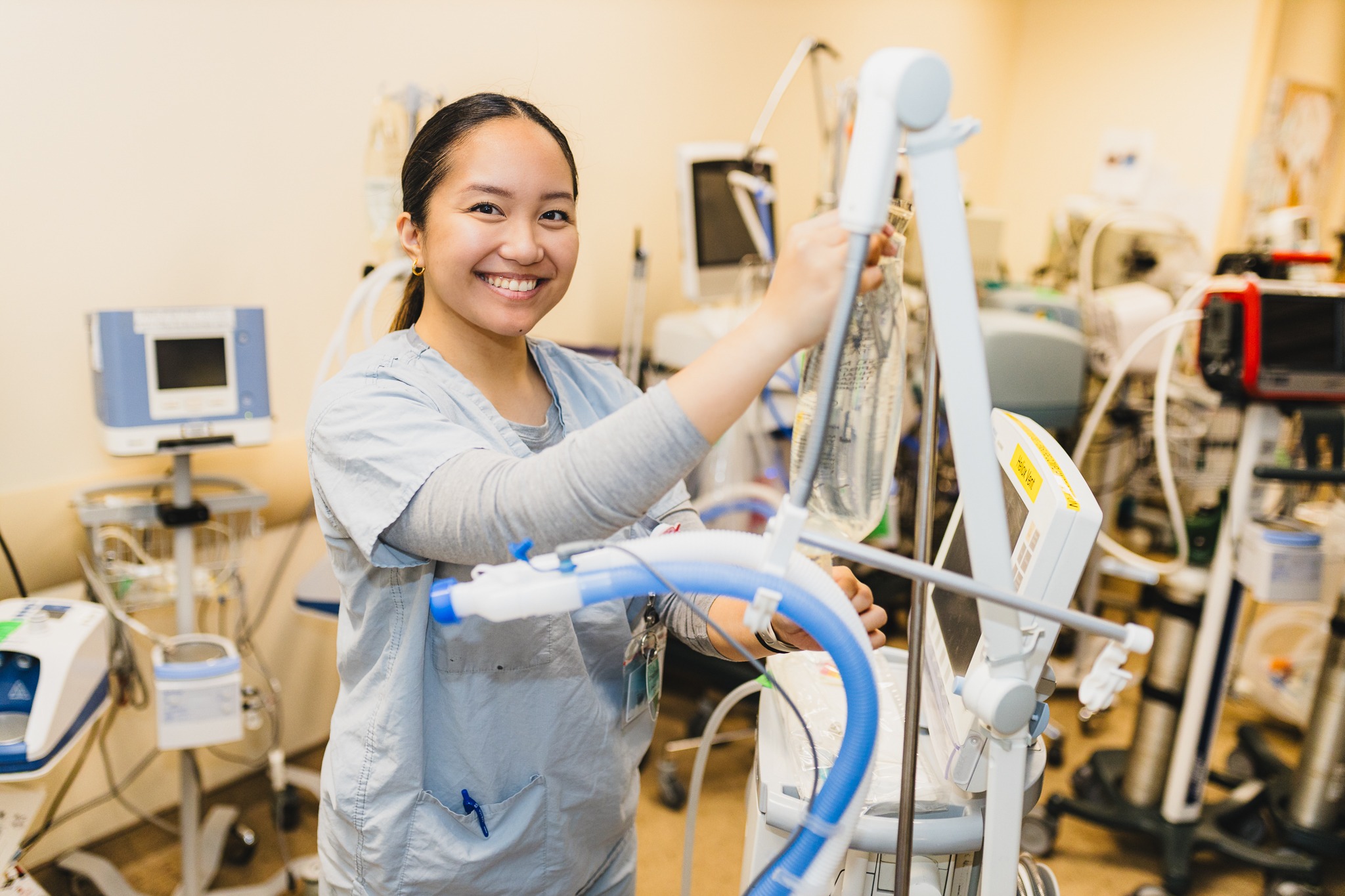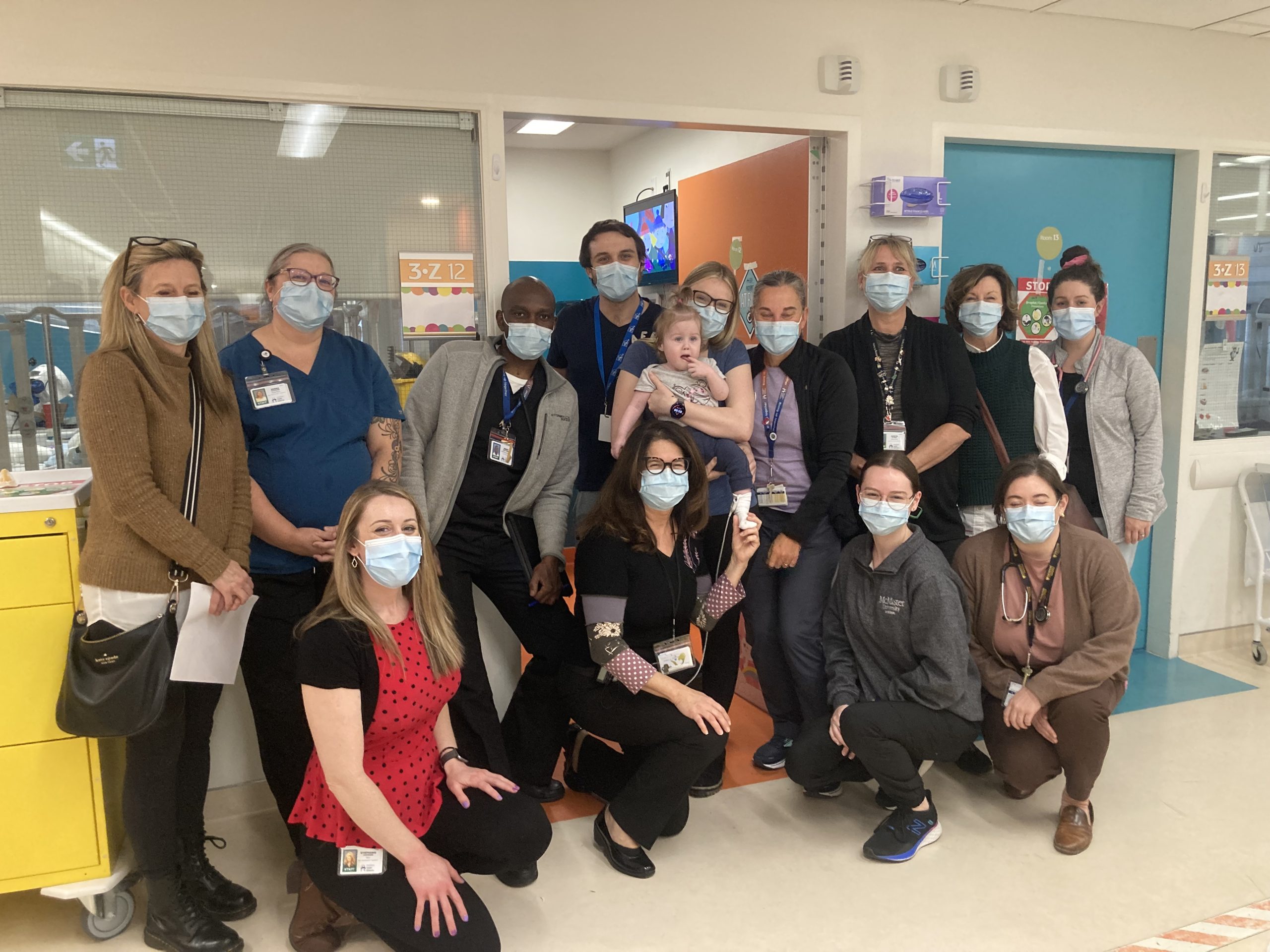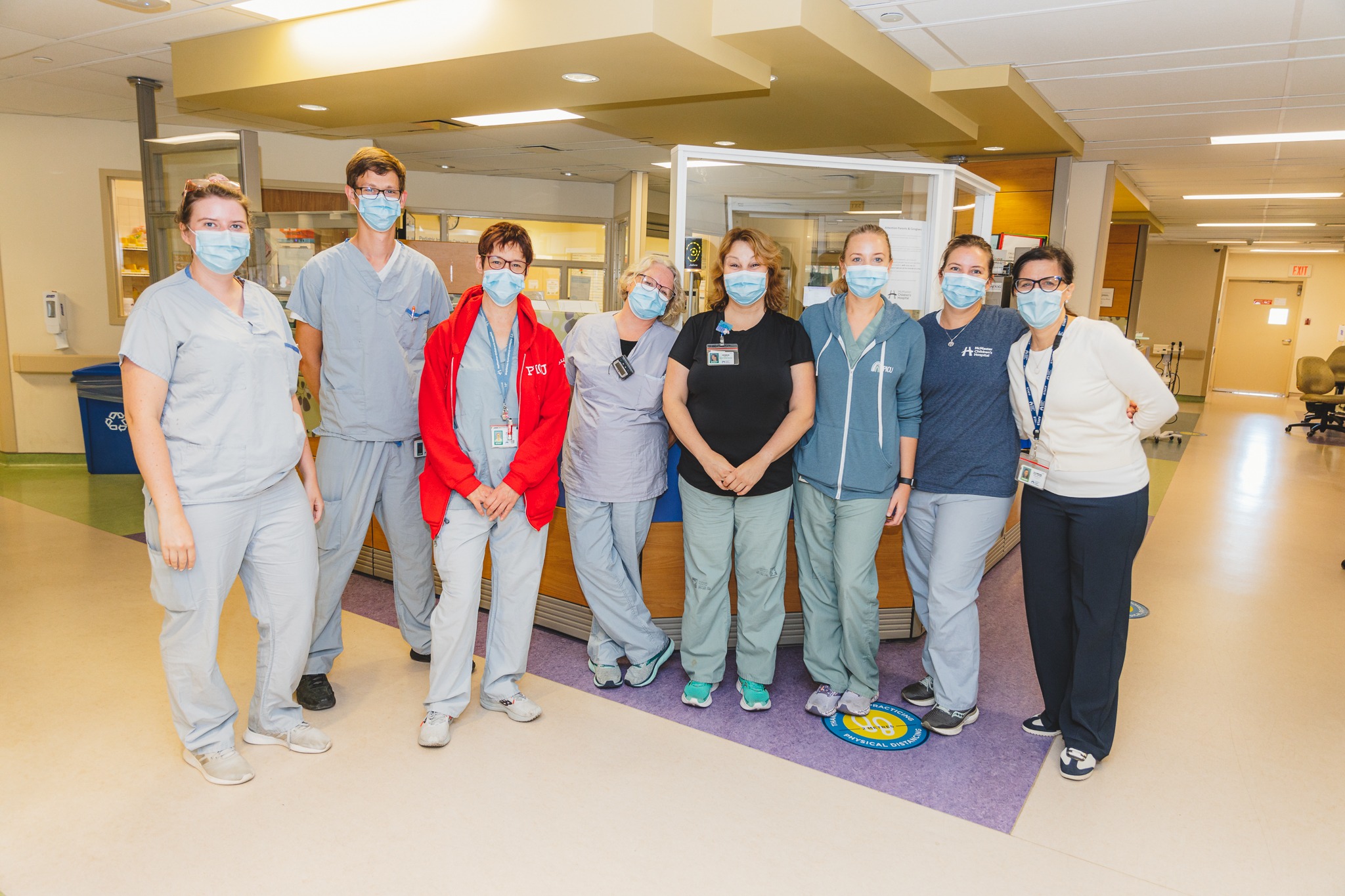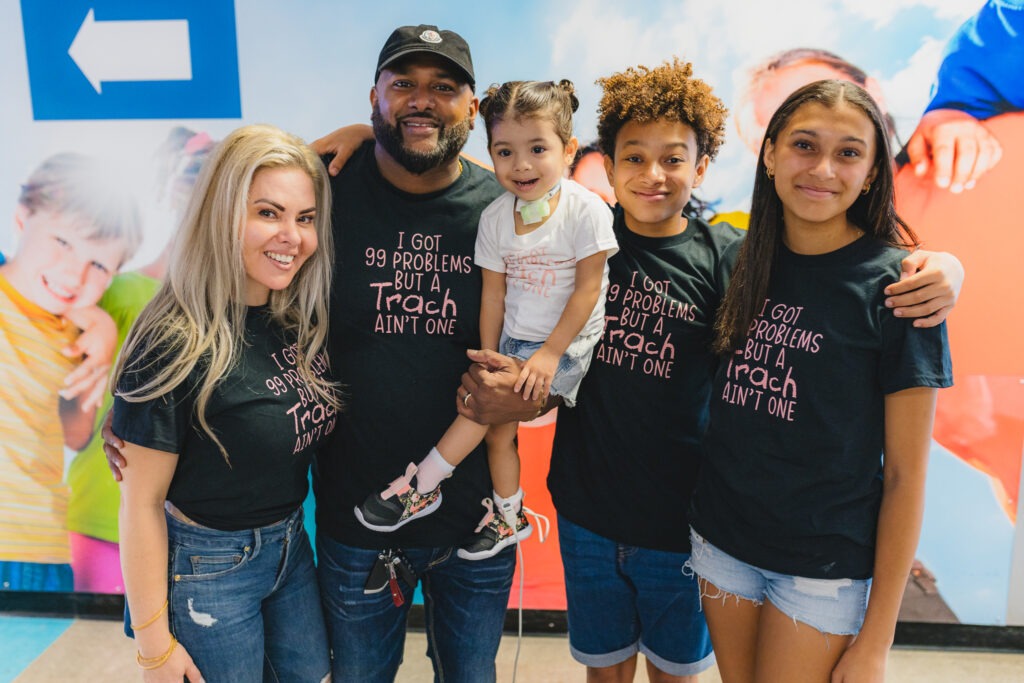
“I got 99 problems, but a trach ain’t one”
A Kitchener couple found a lighthearted way to keep life’s challenges in perspective, especially since their two-year-old daughter Raiya has faced serious, ongoing health issues since birth. After a long stay at Hamilton Health Sciences’ McMaster Children’s Hospital (MCH), Raiya was recently able to go home after care in our Pediatric Intensive Care Unit (PICU) and a tracheostomy procedure to help her breathe.
“We’ve all been through a lot, and this was a moment that we will cherish forever.”
When her family arrived at the hospital on October 3 to take her home, they all wore matching t-shirts that read, “I got 99 problems, but a trach ain’t one,” inspired by the lyrics to Jay-Z’s hit rap song.
“I wanted to make this day and journey memorable for my family and Raiya,” said Sean Silva, Raiya’s dad. “After spending over four months here, it was such a special moment for all of us, especially for our little angel. We’ve all been through a lot, and this was a moment that we will cherish forever.”
Despite facing a challenging journey, Raiya has been fearless with the support of her health-care team, family and friends.
Difficulty breathing leads to hospital admission
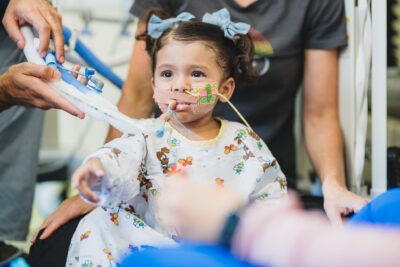
In June, Raiya was admitted to the PICU for difficulty breathing. A viral infection led to her being hospitalized, and needing a breathing tube and ventilator for over 40 days.
Raiya was born prematurely on June 7, 2021 weighing just 1lb 4oz, and she developed lung issues involving a narrowing of her tiny airway resulting in breathing difficulties. That was her first visit to MCH, in our Neonatal Intensive Care Unit.
Unfortunately, during what was meant to be a celebration of her second birthday this past summer, Raiya got sick again. What appeared to be a common cold quickly turned into something more.
Raiya was admitted to the PICU due to her difficulty breathing. A viral infection led to further narrowing of her airways.
After being hospitalized, she needed a breathing tube and was on a ventilator for over 40 days. During this time, she was unable to breathe or speak on her own. Further down the road, she would ultimately require a tube in her neck called a tracheostomy tube that allowed her to breathe.
Coping with new changes
In the PICU, Raiya received chest physiotherapy from Heather Clark, PICU physiotherapist. “I helped break up and clear the mucous in her lungs both before and after she was on the ventilator,” says Clark. “Her therapy continued for several weeks while on the ventilator.”
When Raiya’s condition worsened and she was intubated, she needed many medications, including sedatives, to help her be calm and comfortable. Pain management medication is necessary for any child who requires a ventilator. “To cope with being on a ventilator, and having many lines and tubes connected to her, she was kept sedated in order to keep her calm and fairly asleep,” says Clark.

Dr. Melissa J. Parker, a staff physician in pediatric critical care, who worked with Raiya.
Dr. Melissa J. Parker, staff physician in pediatric critical care who was responsible for Raiya’s care, explains that weaning off medication in the PICU can be a challenging process. “To ensure a stable health pathway and avoid issues of delirium and withdrawal, it’s crucial to create a plan that gradually reduces the dosage of medication,” says Parker.
Various doctors and teams across MCH worked together to care for Raiya, including nurses, respiratory therapists, physiotherapists, occupational therapists, dietitians, and child life specialists.
Staying strong through it all
Even while intubated, Raiya was determined to be active. One of her nurses, Elyse Dunn, remembers the touching moment when Raiya walked in her room with assistance from her bedside team and physiotherapist. “Raiya stood on her own and played with the piano while on a ventilator, an uncommon sight in the PICU,” says Dunn, a registered nurse. “It was a heartwarming moment to watch as she walked to her parents for the first time in weeks.”
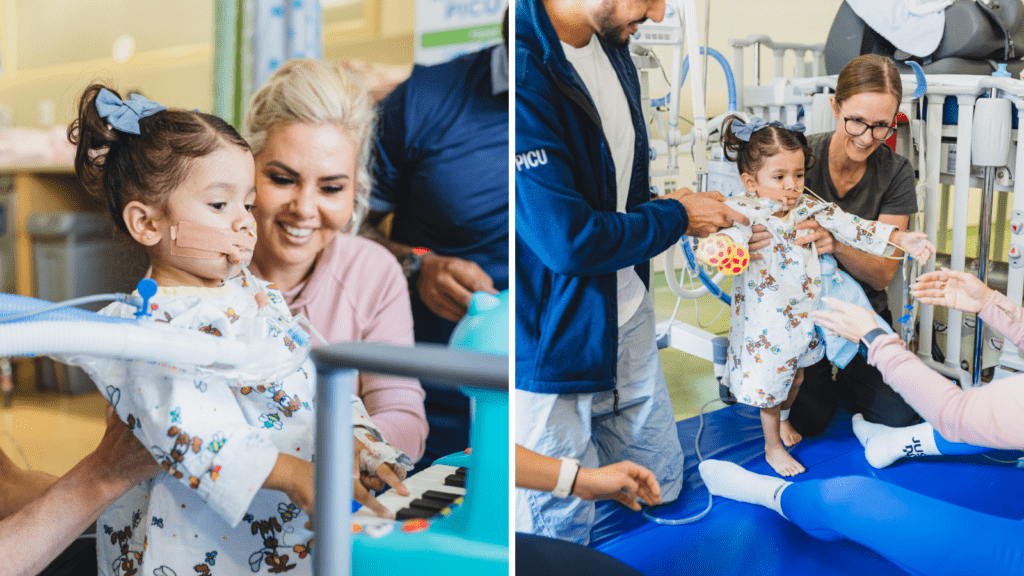
Despite the many challenges faced, Raiya kept moving forward with the support from her family and health-care team.
Physiotherapist Clark developed a program for Raiya to regain her strength and mobility through play. “When her medical team saw she could be safely awake while on the ventilator, I was able to gradually increase her active therapy,” she says.
Even with a breathing tube, Raiya participated in daily activities including playing with balls, Play Dough, having tea parties on the play mat in her room, and eventually walking.
“Being critically ill and immobile in bed can cause many complications, but being able to engage in activities and walking was crucial to Raiya’s recovery,” says Clark. “Situations like this are exactly why I come to work every day.”
Raiya’s condition continued to improve after her first stay in the PICU. Unfortunately, she was readmitted a second time with breathing difficulties requiring a breathing tube and ventilator again. Although eventually she was able to have her tube removed, she would need further support with her breathing.
The call for a tracheostomy
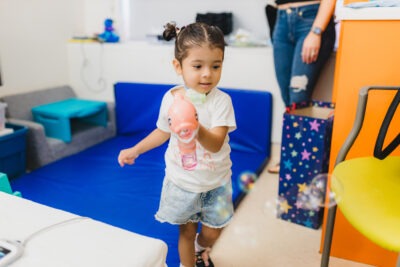
A trach won’t stop this little one.
In August, Raiya had a tracheostomy inserted into her neck to improve her breathing. This procedure involves creating an opening in the front of the neck directly into the windpipe (trachea). A tracheostomy tube (trach) is then inserted to keep the airway open and assist with breathing.
During this time, Raiya received intensive rehabilitation while her parents received training on how to care for her at home with her tracheostomy. Raiya’s tracheostomy is expected to be needed for the next two years.
Family helps during challenging times
The couple is managing the responsibility of taking care of Raiya while balancing their home and two other children.
Sean is grateful for the support he and his family have received during these difficult times, acknowledging the crucial role played by his wife’s parents. “They’ve helped tremendously through these tough times,” says Sean.
Although it’s been a challenging journey, Raiya’s older siblings, Davis and Tavia, have also been lending a helping hand and spending time with Raiya.
Raiya’s mom, Tina, had to quit her job as a hair stylist, and Sean significantly reduced his hours in his renovation company to provide Raiya with the 24/7 care that she will require for the next two years.
Creating a “mini-ICU” at home
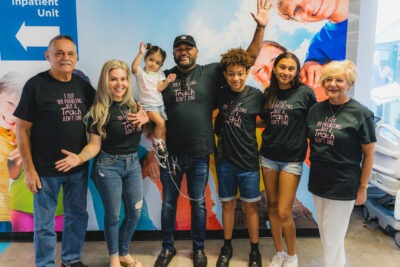
Raiya’s family pictured with her grandparents, (Tina’s parents) saying one last farewell to our PICU.
Sean and Tina, having completed their tracheostomy training, are now caring for Raiya at home. They’ve also hired a nursing team to provide round-the-clock care for her.
“We essentially created a mini-ICU at home, and Tina looks after Raiya throughout the day,” says Sean. “It’s been tough, but we’re doing our best to overcome the obstacles these next two years. We’re very grateful for the amazing staff at McMaster Children’s Hospital who provided Raiya with the best possible care to get her to this point.”

